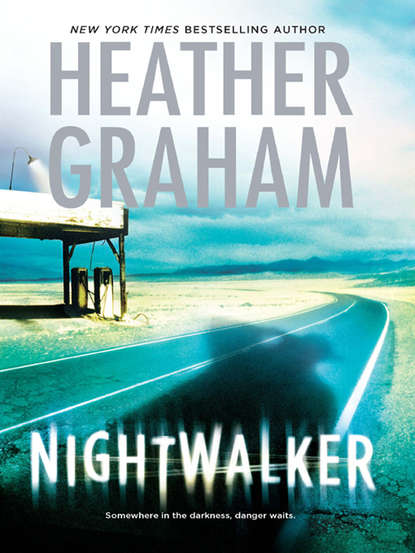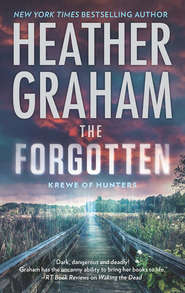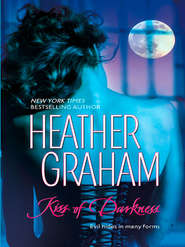По всем вопросам обращайтесь на: info@litportal.ru
(©) 2003-2024.
✖
Nightwalker
Автор
Год написания книги
2018
Настройки чтения
Размер шрифта
Высота строк
Поля
“I wasn’t, but I might have been. Long story. Anyway, I’m sorry, but I really do have to get home now.”
“I’ll take you. My car is just down the Strip.”
“No, no, really. I’m in a hurry, and it’s easier just to hail a cab. But thank you. Thank you so much.”
What the hell could he do? Insist? He didn’t have the right.
“You could be in danger,” he said. What a crock.
She smiled, knowing it was a line.
“Thanks. I’ll be okay.”
He kept his gaze locked on the crystalline blue of her eyes as he reached into his pocket for his card. “Please, call me if you need anything.”
She smiled without glancing at it. “Wolf. Ute?” she asked. “Local tribe? Distant tribe? Hell, Erie? Cherokee? Apache?”
He grinned. “Paiute,” he informed her, then offered her an awkward grin. “All right, so…Sparhawk? Ute, Apache, Nez Perce—stage name?”
“Lakota Sioux, my great-great-grandfather. I’m a real all-American mix,” she replied, sounding amused. They stared at each other for another moment. Then she awkwardly took a step away. “I really have to go. Thank you again.” She hesitated. “You knew him?”
He nodded.
“I’m sorry.”
“I’m always sorry if a man is dead. But he wasn’t a close friend.”
“Oh.”
He frowned. “You didn’t cash in your chips, did you? No time, I guess. I forgot about them in the mass confusion.”
She shook her head. “So did I. I have them, though. I can cash them tomorrow.”
“Those chips represent a lot of money. You could be mugged,” he told her.
She laughed. “A cabdriver isn’t going to know about my chips,” she assured him. “I’m okay, honestly. I’m a big girl. I grew up out here. I carry pepper spray. I’ll be all right. I promise.”
He saw a taxi. He wondered about the grandfather she had mentioned. Was he ill and waiting for her?
Dillon stepped out to the curb and whistled, flagging down the approaching cab. He saw her into it and waved goodbye. There was nothing else to do.
He frowned, watching the cab as it pulled away. There was a strange shadow next to her, almost as if there was a second person in the seat beside her.
His muscles knotted with tension. The cab passed under a streetlight, and he could see that there was only one person in the backseat. She was alone.
So why was he still so uneasy? he wondered as he watched the cab disappear down the street.
2
She should have driven herself, but she’d known that she was likely to have a bad time out at the home, and that she might stop to have a few drinks on her way home, try to console herself with a pity party and take a little time figuring out her life.
The cab seemed very slow.
She was tense with anxiety by the time the driver pulled up in front of her home in Henderson, and she nearly fell over her own feet in her hurry to get out and reach the house.
“Sandra?” She was calling her friend’s name even as she turned the key in the lock. As the door opened, Sandra heard her and came rushing from the back of the house to meet her at the front door.
She was a pretty woman in her mid-thirties and had once been a showgirl, but now she wrote novels for young adults, having found a way to mine her own youthful angst for profit. She also had a sixteen-year-old daughter, born when she was very young herself, and Reggie gave her an even greater insight into the teenage mind.
Sandra Nelson was a good friend. Many people would have shied away from watching Timothy when he was visiting Jessy and she had to go out. Not Sandra. She considered it an easy gig and said all she had to do was listen to Timothy’s stories—and see that he didn’t set the house on fire because he was convinced he needed another log for his grandfather’s sweat-lodge fire.
Sandra’s alarmed stare brought an apologetic smile to Jessy’s face. “I’m so sorry, it’s just that—”
She didn’t finish, because just then a loud gasp came from her right, where the family room abutted a courtyard. “Mom! Mom! It’s Jessy—she’s on TV! A man was murdered!”
Sandra stared at Jessy, who grimaced and went running past her to reach the family room, where Reggie was draped over the big comfortable sofa, staring at the television. She gasped again when Jessy walked in.
Jessy stared at the television. She’d been so focused on getting home that she hadn’t noticed the news cameras out front when she and Dillon Wolf had finally escaped the casino, but there she was. She hadn’t realized that she had actually been hanging on his arm.
“You were involved in a murder?” Sandra asked.
“Forget that. Who the hell’s the hottie?” Reggie demanded. Tall and slim, she had her mother’s green, dark-lashed eyes and a perfect heart-shaped face. Despite her beauty and her age, though, she was basically a nice kid, and Jessy was always pleased when she came over to help Sandra with Timothy.
“Murder?” Sandra repeated.
At that moment, Timothy emerged from his bedroom. He was wearing jeans and a plaid shirt that was on backward. Despite that, he maintained his dignity as he straightened regally and said, “Murder? Yes, it was murder. They can bury my heart at Wounded Knee for a fact, because the slaughter of the American Indian remains one of the greatest tragedies and injustices of our nation’s history.”
“Don’t worry. The Native Americans are taking a just revenge. It’s called bingo, and it’s wonderful. They make money, and no one dies,” Sandra said, placating him gently.
Jessy walked over to give him a hug, but he only stared at her. His eyes, light blue and misted like fog at the coming of day, were blank at first. Then they registered that she was in front of him. “Granddaughter. You’re home. And you’re safe.”
She was startled to feel him trembling as he hugged her. She looked over his shoulder, frowning questioningly at Sandra.
“This just came on,” Reggie said quietly.
“You were in danger,” Timothy said. “They told me so.”
“Who told you so?” Jessy asked.
“The ghost riders. Their ghosts came and told me that I needed to be strong, that you were in danger, and that I need to defend you,” he said earnestly.
“I’m all right. Honestly,” Jessy said, really worried now. Ghosts? This was new. “Timothy—”
“I miss my bed,” he said.
“Tim, you have a bed here,” she told him.
He smiled at her, his eyes misty again. “Yes, and I’m grateful. But it’s not my bed. I should be in my own place, where you come to visit me.”











